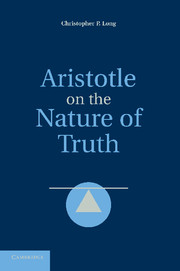Book contents
- Frontmatter
- Contents
- Prolegomenon
- Aristotle on the Nature of Truth
- 1 The Saying of Things
- 2 A History of Truth as Cor-respondence
- 3 Saving the Things Said
- 4 By Way of Address
- 5 By Way of Response
- 6 The Truth of Nature and the Nature of Truth in Aristotle
- 7 On Saying the Beautiful in Light of the Good
- 8 Ecological Justice and the Ethics of Truth
- Works Cited
- Index of Passages Cited
- General Index
7 - On Saying the Beautiful in Light of the Good
Published online by Cambridge University Press: 06 December 2010
- Frontmatter
- Contents
- Prolegomenon
- Aristotle on the Nature of Truth
- 1 The Saying of Things
- 2 A History of Truth as Cor-respondence
- 3 Saving the Things Said
- 4 By Way of Address
- 5 By Way of Response
- 6 The Truth of Nature and the Nature of Truth in Aristotle
- 7 On Saying the Beautiful in Light of the Good
- 8 Ecological Justice and the Ethics of Truth
- Works Cited
- Index of Passages Cited
- General Index
Summary
There has been handed down from those of ancient and earlier times to those of later times a legacy in the shape of a myth that these original beings are gods and that the divine embraces the whole of nature.
Aristotle, MetaphysicsIn speaking about those thinkers who set down “love or desire among the beings as a source,” Aristotle suggests an approach to Empedocles that is at once presumptuous and condescending. He writes, “For if one were to pursue and take hold of Empedocles' thinking [διάνοιαν], rather than what he said inarticulately [ψελλίζεσθαι], one would find friendship was the cause of good things and strife of the bad.” The presumption lies in Aristotle's suggestion that he is able to discern the genuine thrust of Empedoclean thinking independently of the things he said inarticulately. The condescension is heard in the Greek ψελλίζεσθαι, which suggests the babbling of children. Indeed, at the end of his rehearsal of the positions of his predecessors in Metaphysics I, Aristotle repeats the talk of “baby-talk,” extending it beyond the thinking of Empedocles and suggesting, “The first philosophy concerning all things is like babbling [ψελλιζομένῃ], for it is young and just beginning.” Such statements, however, stand in tension with both the manner in which Aristotle's own philosophical thinking proceeds and the things he himself says about the ancients elsewhere.
- Type
- Chapter
- Information
- Aristotle on the Nature of Truth , pp. 201 - 241Publisher: Cambridge University PressPrint publication year: 2010



